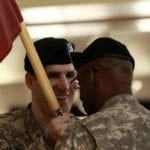I have a confession to make. I am a Ranger reject. That’s right. I attended the Ranger Course from February through May 1995, but washed out in the Mountain Phase after a second recycle. The only reason I bring it up is because I want to refer to a particular experience – but I don’t want anyone to think I earned a Ranger tab. I didn’t.
I recall one incident in the Mountain Phase (preceded by the Benning and Desert phases). We were moving too slowly on a patrol to suit our Ranger Instructors. So, they lobbed an artillery simulator at our platoon and then picked five or six guys to be “casualties.” This meant that for every five Rangers, one became a casualty and had to be carried by four others. Of course, this slowed us down even more. Not only were four guys now carrying a fifth, but this was on very steep terrain, ducking under low-laying rhododendron trees in the middle of the night. So, before long, the impatient Ranger Instructors tossed another artillery simulator at us. And they chose a few more Rangers to be casualties. As a result, for every three guys, one was a casualty. Now, understand. We were not just carrying our fellow Ranger’s body, but also his 70-pound rucksack, his ammo, and his weapon. Naturally, we slowed down to a crawl.
Another artillery simulator came tumbling at us, resulting in more casualties. Now the ratio was one for one – one casualty for one Ranger to carry him.
At that point we were exhausted and completely combat ineffective. Without abandoning weapons and equipment, they were all just too much to carry. Everyone in a leadership position that night failed their patrols. It was a low point in the course.

So what lesson were the Ranger Instructors trying to teach us? I must admit, it was all a little fuzzy that night. But the drift I caught was, “You never leave a Ranger behind. So keep moving fast so no one becomes a casualty.”
I’ve thought about that experience many times since. That feeling of being overwhelmed by having to carry everyone else’s load comes back to haunt me from time to time. That feeling returns especially when members of a team take time off – usually for perfectly legitimate reasons. It returns when they leave the rest of the team to carry their load. Sometimes we don’t understand the math. When someone leaves the team, they not only leave their own mission undone, they place that burden on a, now, smaller team. Then, another decides to take leave or attend a course. This leaves another job undone and places it on the shoulders of an even smaller team.
And, yes, there have been plenty of times when more than half of the team members are absent. Some had perfectly legitimate reasons, some not so legitimate. In the end, they left the remnants of a team to shoulder a very heavy burden.
Now, of course, I blame myself for this – for not being a better manager of my personnel. And I also blame the military. The military had been trying to “do more with less” over the last three decades. If they hadn’t done this, we wouldn’t be in such a state where the absence on one servicemember upsets the whole apple cart. I’m sure this is why so many of us have accumulated so much “use or lose leave.”
But some of the blame has to go to individuals. Those whose planning never takes into consideration what impact their absence might have on the mission. Those who do not consider the impact on the other team members. This is somewhat excusable for Junior Enlisted Soldiers, but not for leaders.
Listen. Obviously we have to take leave. We have to attend career courses. We have to take care of family issues. And we have to follow through on our medical appointments and procedures. But we should always place the mission first (as we recite in the Soldier’s Creed).
And, if we must absent ourselves, we should do whatever is necessary to mitigate the impact of our absence. Otherwise, the faithful few will be like those Rangers, trying to shoulder the burden of their fallen comrades – plus carry their equipment and weapons.
The Scripture recognizes these two responsibilities: to shoulder our own load and to help others with theirs. “Bear one another’s burdens, and thereby fulfill the law of Christ. … For each one must bear his own load” (Galatians 6:2, 6). Every leader should examine his or her own life and conduct. If a leader spends more time being a burden than carrying a burden, something is definitely wrong.
PRAYER:
Dear Father in heaven, please open my eyes to see where I have failed You and others. Help me to shoulder my burden and to be a blessing to my team. Amen.
In article photo: Marines with 1st Battalion, 2nd Marine Regiment wait for nightfall to conduct live-fire exercises on Marine Corps Base Camp Lejeune, N.C., Jan. 24, 2018. The Marines of 1/2 conducted immediate remedial action drills and traversed, searched and engaged targets moving from one to another. (U.S. Marine Corps photo by Cpl. Juan Madrigal licensed under CC by 2.0)







